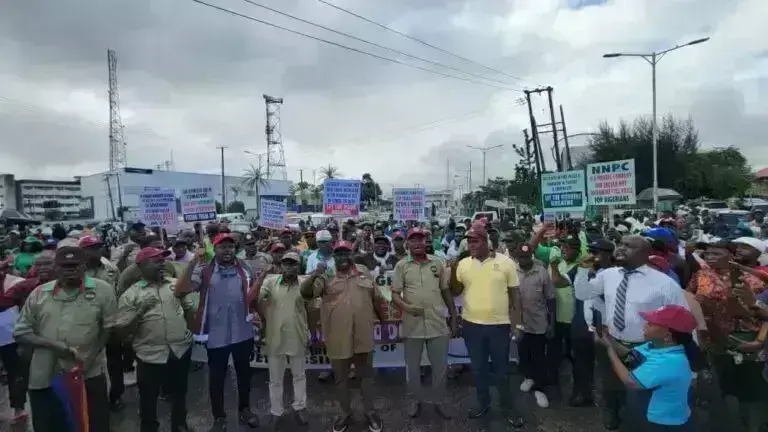- Home
- /
- Features/Spotlight
- /
- How fuel subsidy...
How fuel subsidy removal affect Nigerian workers

Nigerian workers on a peaceful protest
On May 29 during the inauguration of his administration, President Bola Tinubu took a bold step that his predecessors shied away from, the removal of the controversial fuel subsidy.
For years, Nigerians and yearned for the removal of the subsidy which they say had been used by some of the operators of the oil and gas industry to enrich themselves at the expense of other Nigerians.
The subsidy removal was meant free up some money which would be to boost infrastructure and quality of life of the populace.
While some of the aims of the removal have been met, including the astronomical rise in the funds accruing to the Federation Account which is shared monthly by the three tiers of government, others have been largely unmet.
To cushion the effect, the Federal Government rolled out a raft of measures, including N5billion palliatives to state governments which is being released in tranches.
Other interventions proposed by Tinubu include buses across the states and local governments for Mass transit at a much more affordable rate.
He also promised that N100 billion would be invested to acquire 3000 units of 20-seater Compresses Natural Gas (CNG) fuelled buses.
The buses, he said, would be shared to major transportation companies in the states, using the intensity of travel per capital.
He said participating transport companies would access credit under the facility at 9 per cent per annum with 60 months repayment period.
On salary increment, the Tinubu said his administration was working in collaboration with the Labour unions to introduce a new national minimum wage for Workers.
“I want to tell our workers this: your salary review is coming’’, he said.
Other interventions include the signing of four Executive Orders to address unfriendly fiscal policies and multiple taxes that are stifling the business environment and the funding of 75 enterprises with N75 billion to improve productivity.
There is also Micro, Small and Medium Enterprises would be funded with N125 billion out of which N50 billion would be spent on Conditional Grant to 1 million nano businesses between now and March 2024.
The target is to give N50,000 each to 1,300 nano business owners in each of the 774 local governments across the country.
For Agricultural promotion, 225,000 metric tonnes of fertilizer, seedlings and other inputs would be provided to farmers who are committed to the food security agenda.
As the president unveils government’s interventions to reduce the effect of subsidy removal, an expert in Finance and Enterprenuership, Prof. Yusha’u Ango advised that the Interventions should cut across the whole country.
He said that the funding of 75 Enterprise with one billion naira each would have more impact if it gets across all the geo political zones of the country.
“What we are calling for is to ensure that this loan cut across the whole nation so that every society somehow benefits from this.
“The effectiveness of these interventions will be after implementation”, Ango said.
Many state governments on their part have also undertaken some steps to mitigate the impact of the subsidy removal of their citizens.
The organised labour led by the Nigeria Labour Congress (NLC) has engaged in the Federal Government on the need for palliatives to be made available to worker.
After series of threats of strike and dialogue, the Federal Government bowed to the Jeo Ajaero- led NLC and approved N35, 000 wage award to workers.
As workers await the full implementation of the palliative measures, some of them say they face numerous challenges which have the potential to hinder their productivity.
Ms Halima Abdullahi, a worker with a Kaduna-based private auditing firm, said that she now spend N23,000 to fuel her vehicle weekly as against N5,000 before the subsidy removal.
“My house is far from my work place and I use my vehicle to transport myself to work and take my children to school.
“When the fuel price was increase to N530, I bought N19, 500 worth of fuel that lasted for only one week.
“As fuel price hits N615, I boought fuel once. I parked it at home after exhausting the petrol because I wouldn’t continue to spend N23, 000.
“My one month salary was expended on transport alone which led me borrowing; Now I use tricycle to transport myself and my children to school. I spendN2700 daily”, she said.
Abdullahi urged government to immediately increase minimum wage as it would set a pace for private companies to follow.
Corroborating Abdullahi, a civil servant, Sani Idris said he has parked his car at home, removed the battery and covered it with a car cover.
“Previously N1000 fuel was enough for me to go to work and come home but with the removal of subsidy, I had to buy N3000 fuel daily which is something I can’t sustain.
“I use commercial transport now because it’s the best option as it reduces cost. We hope to have an increase in salaries soon so that we can afford fuel,” he said.
The experience of Abdullahi and Idris is replicated in various cities across the country as transportation and food is said to consume more than 70 per cent of workers monthly income.
As workers wait patiently for governments to honour their palliative promises they hope that the wait will not last too long.
By Aisha Gambo



